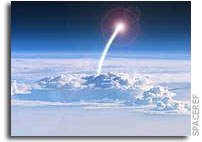Space Tourism and Climate Change
 Space tourism to accelerate climate change, Nature
Space tourism to accelerate climate change, Nature
“Climate change caused by black carbon, also known as soot, emitted during a decade of commercial space flight would be comparable to that from current global aviation, researchers estimate. The findings, reported in a paper in press in Geophysical Research Letters, suggest that emissions from 1,000 private rocket launches a year would persist high in the stratosphere, potentially altering global atmospheric circulation and distributions of ozone. The simulations show that the changes to Earth’s climate could increase polar surface temperatures by 1 deg C, and reduce polar sea ice by 5-15%.”









This is stupid. First, analyzing the effects of 1000 space tourist launches a year is a bit premature, given that so far there are 0 launches per year. Second, they made a lot of assumptions about soot emissions from the launches that seem to be rather dubious. A well-designed rocket shouldn’t be producing *any* soot, much less the vast amounts assumed here. Third, soot emissions do leave the atmosphere on a relatively fast time scale, by climate standards, so (unlike carbon dioxide, which has a relatively long atmospheric lifetime), the effect is not cumulative, and if you stop the launches (or switch to a less inefficient engine), the effect stops.
Keith/Marc… this article is from October of 2010. Why are you linking to it today?
because we are one year closer to that 1000 lunches per year!
rejoice!
They are assuming 1000 Hybrid launches a year, but long before that happens, people will switch to a less expensive technology, like LOX/alcohol or kerosene. So the soot problem will never happen. Of course,you could always use liquid hydrogen for fuel, which burns clean.
SteveFlometrics